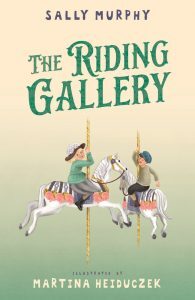Sally Murphy's Blog, page 7
March 2, 2024
A Reveal
From the time I read a verse novel for the very first time, I knew that I wanted to one day write one. Or more than one. It took some time, but, back in 2009, my very first verse novel was released. It looked like this:
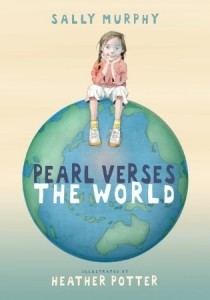
(Actually, it still looks like this because, happily, it remains in print).
That book changed by career, and affirmed that this was a form I wanted to stick with. And, in 2010, this book was released:
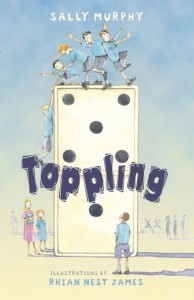
I was onto something. Stories that made people cry, and smile, in one package. This was for me. It took a little time to get the next one right but, in 2014, there was a third:
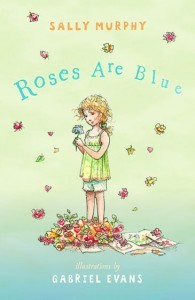
In 2020, a fourth:
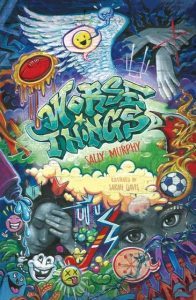
And, just last year, a fifth:
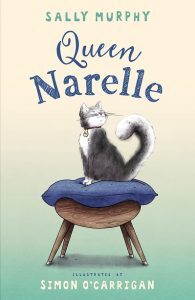
And now, in 2024, here comes number six. For the first time, I am pleased to show you the cover of The Riding Gallery:
The illustrations by Martina Heiduczek are just divine! Out in July, The Riding Gallery brings together two of my writing loves – the verse novel form AND historical fiction, based on the true story of a St Kilda merry go round during World War 1. Can’t wait to share it with you but, for now, feel free to admire the cover. I am!
March 1, 2024
Happy Toes and Happy Days
This morning I have happy toes! Why? Because I have done something I’ve been meaning to do for ages – and it really did not take me long at all.
What did I do? Created a playlist over on Youtube of the various poetry videos I have shared over the years. Inspired by the release this week of Right Way Down,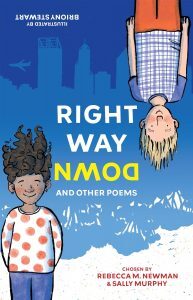 I’ve been spending even more time than usual sharing poetry, poetry ideas and more with the world, including LOTS of posts on my Instagram account. And this, in turn, inspired me to head over to my YouTube channel and create a playlist just of poetry videos. You can see it here. There’s a blend of original poems by me, classic poems, and extracts from my first four verse novels. Now that I’ve put it together as a playlist, I am feeling inspired to create some new videos, so watch this space.
I’ve been spending even more time than usual sharing poetry, poetry ideas and more with the world, including LOTS of posts on my Instagram account. And this, in turn, inspired me to head over to my YouTube channel and create a playlist just of poetry videos. You can see it here. There’s a blend of original poems by me, classic poems, and extracts from my first four verse novels. Now that I’ve put it together as a playlist, I am feeling inspired to create some new videos, so watch this space.
And the happy toes? That’s because one of my favourite video poems is this one, the very first video poem I made, back in 2016:
I hope you enjoy these offerings, and would love to hear if you enjoy them or if you you use them in your classroom.
February 29, 2024
Poetry Friday: A lesson from ray
Last week was a busy one.
I spent most of the week on beautiful Rottnest Island (more correctly called Wadjemup) off the coast of Perth, researching, writing but also swimming and snorkelling. There is always plenty to see under the sea, but my favourite encounter was with an Eagle ray which I spotted within moments of entering the water and followed, Gopro outstretched, but also with my heart full. What a privilege to watch this beauty dance and skate and then, just as I was about to leave it be, I watched as it dug intently, I assume looking for a tasty tidbit. If you look you should spot the fish lurking behind, apparently waiting for the scraps.
Afterwards, I wanted to write about the encounter, but nothing came. Nor did it when I first posted the edited video on Monday, but later I started thinking about the other lovely did thing I did last week – which was to attend my nephew’s wedding back in Perth.
It was a joyful occasion (as weddings should be) and, after the young couple took to the dance floor, I found myself dancing with a young man who was a much more competent dancer than I. My initial reaction was to feel awkward that I didn’t know the steps. But I fumbled through and soon found myself laughing and having fun. And isn’t that the point of dancing?
So here’s the poem I’ve drafted trying to capture those two moments:
A Lesson
On Tuesday
I float above a ray
as she dances
and dips.
A graceful dancer
not caring
who sees.
No need for a partner
a witness
or even a tune
played
anywhere but inside her.
On Friday
I watch dancers
at my nephew’s wedding
and
when I am drawn onto the floor
feel momentarily awkward –
I don’t know the steps
or the tune.
But as I move
I feel the joy
of being alive
and think
for a moment
of my ray.
(Sally Murphy 2024)I think my ray will appear again in my writing, but for now, I feel glad to share her with you. And, speaking of sharing, today’s Poetry Friday roundup is hosted by Linda, who also has an important reminder about the choices we are making every day. Among other things, I’m choosing to spread poetry, in the hopes of making the world a better place, and am off to see what my other Poetry Friday friends are sharing today.
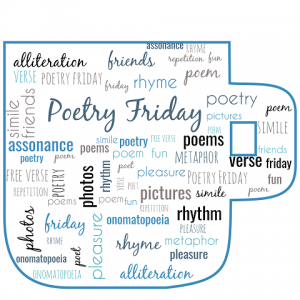
February 28, 2024
What I Read in February 2024
It’s the last day of February and I’m getting in early to post what I read this past month. I read 10 books, one more than January but, very unusually, the majority of these were for adults. I don’t think I remember another month when I read only one book for children. This is mainly a reflection of being deep into research for a historical fiction project.
Here’s what I managed to finish this month:
Children’s Books Countdown to Yesterday, by Shirley Marr (Penguin, 2024).Full disclosure: I love Shirley Marr as a just t wonderful human being so it is unlikely I would ever say anything not-positive about one of her books. Fortunately, that is not likely to be a problem, as she is a superb writer. I was lucky enough to be at the launch of this book and of course then had to come home and gobble it up. A beautiful story of a boy struggling with the change caused by his parents’ divorce, his struggles to fit in at school and his obsession with going back in time.Books for Adults
Countdown to Yesterday, by Shirley Marr (Penguin, 2024).Full disclosure: I love Shirley Marr as a just t wonderful human being so it is unlikely I would ever say anything not-positive about one of her books. Fortunately, that is not likely to be a problem, as she is a superb writer. I was lucky enough to be at the launch of this book and of course then had to come home and gobble it up. A beautiful story of a boy struggling with the change caused by his parents’ divorce, his struggles to fit in at school and his obsession with going back in time.Books for Adults
 How to ADHD: An Insider’s Guide to Working with Your Brain (Not Against It), by Jessica McCabe (Rodale Books, 2024). This book isn’t out in Australia yet but, after hearing about it, I couldn’t wait, so listed to the audio version, which IS available. Then, when the Australian edition comes out (in March, I believe), I will be buying the hard copy and reading again. A really insightful guide into navigating the challenges of living with ADHD, from the creator of the Youtube channel of the same name, which has over 1.6 million subscribers – a testament to its value if, like me, you have ADHD.
How to ADHD: An Insider’s Guide to Working with Your Brain (Not Against It), by Jessica McCabe (Rodale Books, 2024). This book isn’t out in Australia yet but, after hearing about it, I couldn’t wait, so listed to the audio version, which IS available. Then, when the Australian edition comes out (in March, I believe), I will be buying the hard copy and reading again. A really insightful guide into navigating the challenges of living with ADHD, from the creator of the Youtube channel of the same name, which has over 1.6 million subscribers – a testament to its value if, like me, you have ADHD.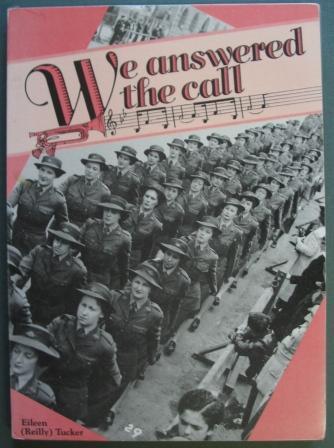 We Answered the Call, by Eileen (Reilly) Tucker (Eileen Tucker, 1991). I am deep in research for a historical fiction novel, and this has been a really useful read, but also is an interesting insight into the women who served in the Australian Women’s Army Service in World War 2.
We Answered the Call, by Eileen (Reilly) Tucker (Eileen Tucker, 1991). I am deep in research for a historical fiction novel, and this has been a really useful read, but also is an interesting insight into the women who served in the Australian Women’s Army Service in World War 2.
 The Lost Flowers of Alice Hart, by Holly Ringland (Harper Collins, 2018). I picked this up from a little library shelf in my local shopping centre, ignoring my attempts to reduce the to-read pile I already have. Glad I did – this is a rich, compelling read that I couldn’t put down. I’ll be returning it to the little library too, in hopes someone else will get to love it, too.
The Lost Flowers of Alice Hart, by Holly Ringland (Harper Collins, 2018). I picked this up from a little library shelf in my local shopping centre, ignoring my attempts to reduce the to-read pile I already have. Glad I did – this is a rich, compelling read that I couldn’t put down. I’ll be returning it to the little library too, in hopes someone else will get to love it, too.
 We Need Snowflakes: In defence of the sensitive, the angry and the offended, by Hannah Jewell (Coronet, 2022). Picked this up on the strength of the title and, while it wasn’t an easy read, it was a very insightful one, and I would love to see more right-minded people get the messages it contains, with its excellent exploration of whether cancel culture, political correctness and snowflakery are really spiralling out of control.
We Need Snowflakes: In defence of the sensitive, the angry and the offended, by Hannah Jewell (Coronet, 2022). Picked this up on the strength of the title and, while it wasn’t an easy read, it was a very insightful one, and I would love to see more right-minded people get the messages it contains, with its excellent exploration of whether cancel culture, political correctness and snowflakery are really spiralling out of control.
 You’ll Be Sorry!: How World War II Changed Women’s Lives, by Ann Howard (Big Sky, 2016). An interesting complement to We Answered the Call (above), similarly tracing the contribution of women to World War 11, especially in the AWAS. This one also traces their lives after the war, highlighting the challenges of the post war years for the women who served.
You’ll Be Sorry!: How World War II Changed Women’s Lives, by Ann Howard (Big Sky, 2016). An interesting complement to We Answered the Call (above), similarly tracing the contribution of women to World War 11, especially in the AWAS. This one also traces their lives after the war, highlighting the challenges of the post war years for the women who served.
 The Other Bridget, by Rachael Johns (Penguin, 2023). I was lucky enough to go an see Rachael Johns in conversation with Anthea Hogdson when they visited Bunbury this month, and, of course bought the book on the spot. I found myself glued to the couch, reading it over a few nights. Set in Fremantle, I could picture the streets and the places, and enjoyed the combination of romance, family, friendship and other plots. Good stuff.
The Other Bridget, by Rachael Johns (Penguin, 2023). I was lucky enough to go an see Rachael Johns in conversation with Anthea Hogdson when they visited Bunbury this month, and, of course bought the book on the spot. I found myself glued to the couch, reading it over a few nights. Set in Fremantle, I could picture the streets and the places, and enjoyed the combination of romance, family, friendship and other plots. Good stuff. Bunbury Civilians in Wartime, by the Bunbury Oral History Group (Milligan House, 2001). Another title read as a research WW2. This one is a fascinating look at what life was like in Bunbury, where I live, during the war yearsLove, Faith and Numbers, by Raihanaty A. Jalil
Bunbury Civilians in Wartime, by the Bunbury Oral History Group (Milligan House, 2001). Another title read as a research WW2. This one is a fascinating look at what life was like in Bunbury, where I live, during the war yearsLove, Faith and Numbers, by Raihanaty A. Jalil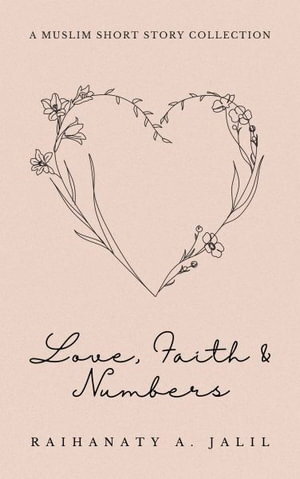 (Raihanaty, 2022). I picked up this little volume in the bookstore at the Perth Writer’s Festival last week. I didn’t get to hear the author speak, as I could only attend a few sessions, but I really enjoyed this which is a series of short stories which also works as novelette, following the love life of a Muslim woman named Zakia. I really enjoyed both the story and the opportunity to challenge my Western perspectives on Muslim relationships, something the blurb encourages readers to do.
(Raihanaty, 2022). I picked up this little volume in the bookstore at the Perth Writer’s Festival last week. I didn’t get to hear the author speak, as I could only attend a few sessions, but I really enjoyed this which is a series of short stories which also works as novelette, following the love life of a Muslim woman named Zakia. I really enjoyed both the story and the opportunity to challenge my Western perspectives on Muslim relationships, something the blurb encourages readers to do. 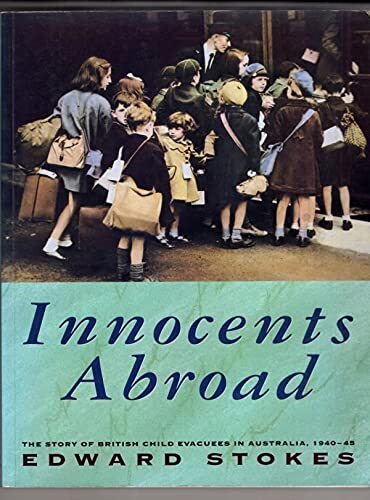 Innocents Abroad: The Story of British Child Evacuees in Australia, 1940-45, by Edward Stokes (Allen & Unwin, 1994). And yes, another read for research, although this one is tangential to the story I am researching. Fascinating, and thought provoking, to read the stories of of the child evacuees who were sent to Australia from Britain during WW2.
Innocents Abroad: The Story of British Child Evacuees in Australia, 1940-45, by Edward Stokes (Allen & Unwin, 1994). And yes, another read for research, although this one is tangential to the story I am researching. Fascinating, and thought provoking, to read the stories of of the child evacuees who were sent to Australia from Britain during WW2.That brings my total for the year to 19, with lots more to come in 2024, a year not of fast reading, but of meaningful reading.
February 27, 2024
Right Way Down is Here!
Hooray! Hooray!
Right Way Down‘s on sale today!
And, fortunately, the poetry it contains is a wee bit better than my excited jingle! With poems from an array of West Australian poets (see the full list here) and fully illustrated by the award winning Briony Stewart, there is something for every reader.
You can find Right Way Down in a brick and mortar bookstore in Australia from today, or you can order it online.
February 25, 2024
Salmon Bay Ray
I was lucky enough to spend time on the beautiful Rottnest/Wadjemup last week. In between writing, researching and reading, I spent lots of time in the water, including this marvellous encounter with an eagle ray.
It may not look like writing or research, but I am sure this ray is going to turn up in a story or poem when I can find a way to capture its beauty and the awe I felt to be alone with it for so long. In the meantime, I hope you enjoy the video.
CBCA Notables Announcement
The annual announcement of the CBCA Children’s Book of the Year Notables list is just days away, and I make a tiny appearance in this video to celebrate the announcement.
I won’t comment on how difficult it is to get a kitten to cooperate for the taking of a photo, especially when there is no one else available to take the picture! Perhaps the magic is that we got there in the end 
February 15, 2024
Poetry Friday: My Beach is a Poem
It’s Poetry Friday and, if you’ve read my last few posts, you’ll know I’ve been thinking a lot about what poetry is – with some surprising results, including last week’s comparison of poetry to chicken cacciatore.
Yesterday, as I took my morning walk on ‘my’ beach (I do share it with other locals, but sometimes it really does feel like it is there just for meeeeee). I thought for perhaps the millionth time how very beautiful it is, in all it’s different faces. The line ‘My beach is a poem’ came to me and, at home, this is what came out:
My beach is a poem: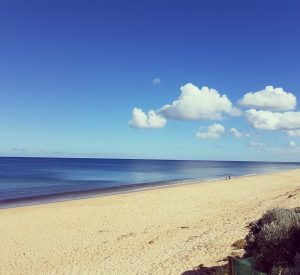
laying out her
glories each morning;
welcoming me
to her sand.
My beach is a poem:
her salty air
medicine
to soothe
my troubled mind.
My beach is a poem:
water like sparking jewels
spilling from
a sandy treasure chest.
My beach is a poem:
whispering waves
singing and crooning
their morning tune.
My beach is a poem.
(Sally Murphy, 2024)As a first draft, I like it, and could see it being a useful mentor text, with each verse using a different poetic technique. and the repeated line ‘My ______ is a poem.’
Speaking of beaches, I am lucky enough to be heading off for the next week to visit the beautiful Rottnest Island (also known by its traditional name, Wadjemup) , for some snorkelling, some beach walking and, importantly some research and writing time. Feel sorry for me? You shouldn’t! I’d take you with me if I could.
Before I head off, I’m off to checkout the other Poetry Friday goodness. Margaret is hosting the weekly roundup.

February 8, 2024
Poetry Friday: What do poetry and chicken cacciatore have in common?
Last week I posted about trying to define poetry. With Right Way Down coming out at the end of the month, I am putting lots of time into pondering how to spread the poetry word.
the end of the month, I am putting lots of time into pondering how to spread the poetry word.
So when it came time to post today, I thought I’d continue the theme, and perhaps look at how else I could write about poetry. I thought I would write a found poem, or back out poem, and headed to dictonary.com to see what the definition of poetry might offer.
What it offered was a surprising twist. There were three possible definitions. The first two were fairly straightforward. But the third reminded me that we sometimes call things poetry when they have ‘ qualities that are suggestive of or likened to those of poetry’. And there, in italics, was an example: Marcel, that chicken cacciatore was an absolute poem.
Hmm. Not only did I instantly want to eat chicken cacciatore (it’s been a loooong time) but also, my brain wanted to make that cacciatore into an actual poem. So, instead of a poem about poetry, I ended up sitting down and writing a poem about cacciatore.
Chicken Cacciatore
Rich aroma
fills my nose
my mouth
my heart.
Onions
and herbs
chicken
and tomatoes
and all that rich rich goodness
simmering
on the stove.
Mamma has a recipe
but
when I looked
it was missing
the one key ingredient
I know she uses every time:
Love.
(Sally Murphy, 2024)
So what do cacciatore and poetry have in common? Everything! Carefully put together, with love, to fill up the senses – and, if they’re well made, leaving you wanting more, whether it’s right now, or tomorrow, or next week.
Me? I want more poetry right now, so I am off to check out the love-filled Poetry Friday roundup, which is hosted by the wonderful Carol. Afterwards, I just might be digging out my recipe book!

February 1, 2024
Poetry Friday: What is poetry?
It’s Poetry Friday and I am excited, because it’s also February, and that means in just four weeks the poetry anthology I co-edited, Right Way Down, will be released and head out into the world.
four weeks the poetry anthology I co-edited, Right Way Down, will be released and head out into the world.
As a result, in between grinning in wild anticipation, I am going to be thinking and writing and talking about poetry A LOT from now until then (and beyond).
I thought I would start this series of posts with some thoughts on what poetry is. I discovered back when I was completing my Doctoral thesis, that while most people have opinions about poetry, few people can neatly define what it is. So, I decided, the easiest way for me to define it was with this poem:
A Poem
A poem
is a whole lot of words
a plethora of words
a smattering, a scattering
a shattering of words
thrown on a page
in carefully created
chaos
to make you wonder.
(Copyright Sally Murphy 2016).
Later, when I wrote Poetry for Pleasure and Purpose, I still couldn’t find a better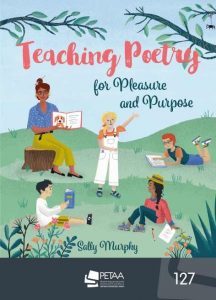 definition, so I put the poem in there as well, along with a shape poem about how poetry makes me feel. This poem had first appeared here on my blog way back in 2014, looking like this:
definition, so I put the poem in there as well, along with a shape poem about how poetry makes me feel. This poem had first appeared here on my blog way back in 2014, looking like this:
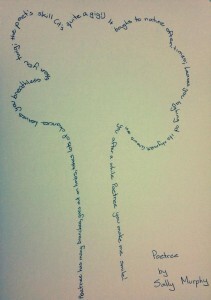
Poetree
has lots of branches
goes out on limbs
takes lots of chances.
Leaves you breathless
when you twig
the poet’s skill
(it’s quite a gig!)
It boughs to nature
oftentimes
leaves you marvelling
at its rhymes.
Grows on you
after a while.
Poetree
you make me smile
(Copyright Sally Murphy 2014).
(You’ll be pleased to know that the amateur drawing I did was replaced in the book by a professionally made one).
While these two poems are different, I think they highlight the two things which, for me, are key in good poetry – the ability to make the reader marvel or wonder at something, and the ability to make the reader feel something. I can’t wait to share this book with the world. It will make you marvel at the cleverness of the many poets whose work is featured. It will make you feel all kinds of things, too – you might laugh out loud, you might cry or you might sigh at the perfect way a moment is captured.
I almost can’t wait for it to be released, but because I HAVE to wait, I plan to spend the month sharing lots of poetry related goodness. First, I am off to see what my Poetry Friday friends are up to. The Roundup is hosted by Mary Lee.

